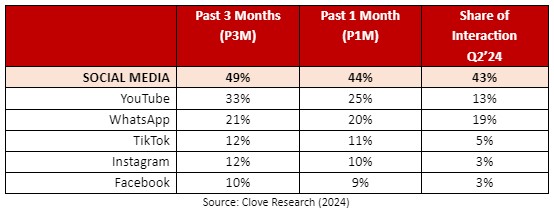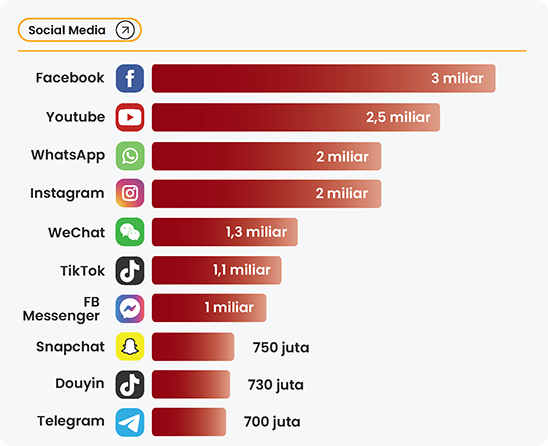
Can Modern Companies Succeed Without Social Media?
21 October 2024
In today's digital era, social media has become a crucial component for brand success. Nearly all companies across various sectors are strengthening their digital presence on multiple social media platforms as part of their marketing strategies.
However, not all companies follow the same path. Several major brands, such as Lush, Bottega Veneta, and Wetherspoon, have decided to delete their social media accounts as part of their business strategies. This decision was made for various reasons, ranging from privacy concerns to the negative impact of social media on society.
1. LUSH
This British cosmetics brand, known for its handmade, vegan, and cruelty-free products, decided to no longer be active on social media. They deleted their accounts from platforms such as Instagram, TikTok, Facebook, Snapchat, and WhatsApp in the 48 countries where they operate. Lush announced the deletion of their accounts in November 2021, citing that these platforms hinder meaningful conversations with customers. They wanted to refocus on delivering quality content on their own website, though this raised concerns about the potential negative impact on sales and customer engagement.
According to Lush’s Chief Digital Officer, social media contradicts the essence of their products, which are designed to help people relax and focus on their well-being. Social media has become the antithesis of this intention, with algorithms designed to make people endlessly scroll, preventing them from truly relaxing.
2. BOTTEGA VENETA
This Italian luxury brand also took a similar step in 2021, deleting their Instagram and Facebook accounts. The main reason was to avoid the cultural homogenization that often occurs on social media, where brands tend to align their strategies solely to meet platform expectations.
Instead, Bottega Veneta shifted to more exclusive and curated content, such as an online magazine. They also maintained relationships with their audience through collaborations with brand ambassadors and fans, who they hope will organically promote the brand through word-of-mouth.
3. WETHERSPOON
This British pub chain deleted their social media accounts in 2018 due to issues with management and ineffective usage. Despite this, they recorded an increase in revenue after taking this step, although overall profits slightly declined.
Although these moves are rare, several other companies—including the three mentioned above—have opted out of social media, particularly due to scandals involving data misuse and ethical issues. However, a survey conducted by Clove Research indicates that the majority of company executives still strongly believe that investing in social media is essential to remain relevant in today's market, especially in Indonesia.
Overall, while some brands have chosen to delete their social media accounts, they face significant risks as social media remains a key channel for reaching consumers and enhancing brand awareness. This shows that such a strategy can be high-risk and may not succeed in the long term.
So, Is Social Media Beneficial for Brands and Companies?
According to data from Clove Research in 2024 (Q2) with 1,260 respondents, social media accounted for 43% of the total interaction share.

Additionally, data from We Are Social—Social Media Platforms with the Most Active Users Globally (April 2023)—shows:

When utilized by brands, social media can offer many significant benefits, especially in building brand awareness, direct consumer interaction (share of interaction), and increasing engagement. Social media enables brands to reach a wider global audience, strengthen customer loyalty, and facilitate more personalized marketing.
With creative content and the right strategy, social media can also drive direct sales and help brands monitor market trends. However, it is important to note that these platforms also pose reputational risks if not properly managed or if privacy issues arise.
Furthermore, social media offers other benefits for brands, including:
- Increased Website Traffic: Social media can drive more visits to a brand’s website through shared links, increasing conversion opportunities.
- Consumer Data and Analytics: Social media provides deep insights into consumer behavior and preferences through interaction data, which can be used to improve marketing strategies.
- Collaboration with Influencers: These platforms open up opportunities to collaborate with influencers to boost brand credibility and expand audience reach.
- Feedback and Reviews: Consumers can provide direct reviews that can serve as a tool for product and service evaluation.
Conclusion
Despite its challenges, social media remains a key channel for most companies to reach their audience, build brand awareness, and create meaningful interactions. The decision to leave social media, as made by Lush, Bottega Veneta, and Wetherspoon, can be successful under certain conditions, but the majority of modern companies still rely heavily on social media to stay relevant and competitive in the market.
Mungkin anda akan menyukai ini



